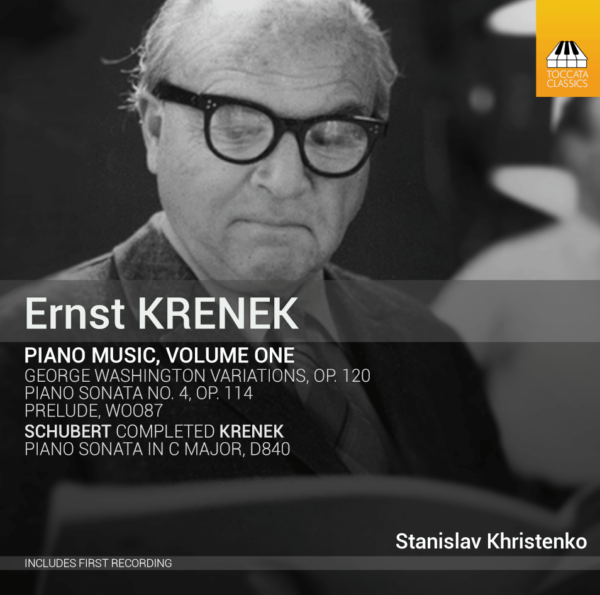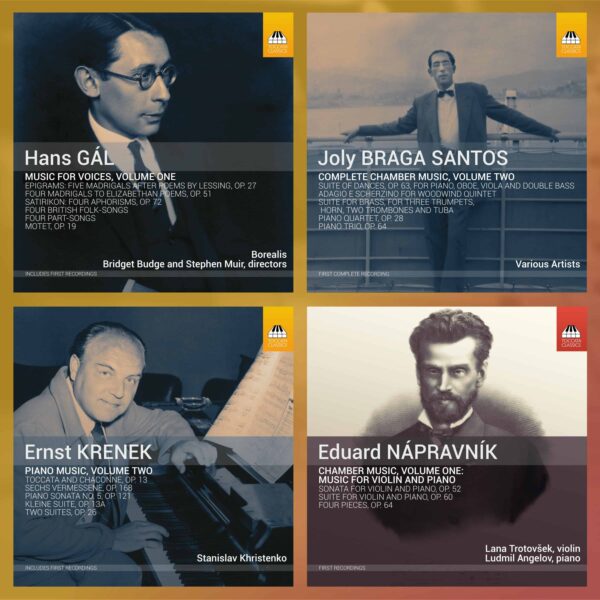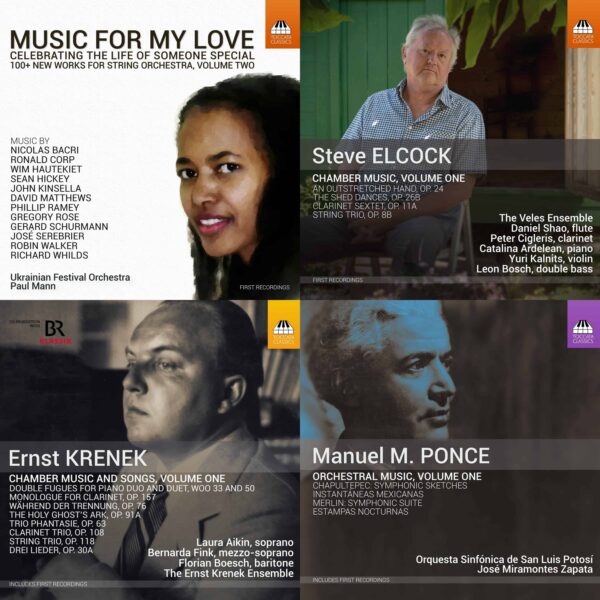Ernst Krenek: Piano Music, Volume One
This first extended survey of the piano music of Ernst Krenek (1900–91) opens with his Fourth Sonata of 1948, which revisits the graceful elegance of the First Viennese School in the style of the Second. It continues with the witty George Washington Variations and the first recording of a brief Prelude written for the Swiss patron of music, Werner Reinhart, and concludes with Krenek’s completed version of Schubert’s unfinished Piano Sonata in C major, d840.
Stanislav Khristenko, piano
Listen To This Recording:
- Piano Sonata No. 4, Op. 114: I Sostenuto
- Piano Sonata No. 4, Op. 114: II Andante sostenuto, con passione
- Piano Sonata No. 4, Op. 114: III Rondo. Vivace
- Piano Sonata No. 4, Op. 114: IV Tempo di minuetto, molto lento
- George Washington Variations, Op. 120: I Washington’s Grand March
- George Washington Variations, Op. 120: II The same elaborated upon
- George Washington Variations, Op. 120: III Battle Music
- George Washington Variations, Op. 120: IV Elegy
- George Washington Variations, Op. 120: V The Chase (a canon)
- George Washington Variations, Op. 120: VI Sarabande
- George Washington Variations, Op. 120: VII Grand Finale, with the Martial Cotillion
- Prelude, WoO87: Allegro ma non troppo, vigoroso
- Piano Sonata in C major, D840: I Moderato
- Piano Sonata in C major, D840: II Andante
- Piano Sonata in C major, D840: III Menuetto. Allegretto
- Piano Sonata in C major, D840: IV Rondo. Allegro





MusicWeb International :
‘Given the quality of this inaugural volume we can look forward to the second volume with confidence.’
—Jonathan Woolf, MusicWeb International
Examiner :
‘… According to the description on the back of the jewel case, this is the “first extended survey of the piano music of Ernst Krenek.” …
The fourth piece is very much an academic exercise, a completion of Franz Schubert’s D. 840 (“Reliquie”) piano sonata in C major. … My personal opinion is that this completion exercise tells us more about Krenek-the-scholar than it does about Krenek-the-composer. The use of Rondo form in the late Schubert sonatas is a frequent one, and renek’s completion of the D. 840 movement suggests that he had internalized an overall architecture consistent with Schubert’s completed efforts. …
Among the three original compositions, the Opus 120 “George Washington Variations” has a similarly playful aesthetic.This uses the basic framework of variation to explore a broader scope of music from the time when our country was still a colony. …
The only sonata on this recording is the fourth, Opus 114 composed in 1948. … Indeed, in Opus 114 Krenek demonstrates his mastery of the same kinds of melodic contours that can be found in atonal Schoenberg; but the result almost amounts to ear training for those still trying to get a handle on how to listen to Schoenberg.
Finally, there is the world premiere recording of a piece that is not yet included in the Grove list of Krenek’s compositions, the WoO 87 prelude composed in 1944. … This is another piece that seems to reflect on Schoenberg’s Opus 29 and its approach to realizing structures of the past through an atonal syntax.
Nevertheless, this is a recording that allows the listener to approach Krenek from a variety of different points of view, so to speak; and, in that respect, it provides an excellent introduction to what he achieved as a composer.’
—Stephen Smoliar, Examiner
Fanfare Magazine :
‘The cover photo of Krenek on this disc of solo piano music shows the graying composer, horn-rimmed glasses perched on his nose, staring intently, presumably at a score, with the hint of a smile beginning to appear on his lips. It is an apt visual metaphor for his music; much of it is concisely, smartly constructed, but there is also often an undercurrent of humor in his writing. The Piano Sonata No. 4, for example, is a Modernist, post-Schoenberg work of tough-sounding fistfuls of glinting blasts of notes, yet the faster music, especially the Rondo, shimmers with a Haydnesque sense of wit. With the George Washington Variations the humor is much closer to the surface. … Krenek takes the jaunty tune through a parade of styles, including richly chromatic polytonality, 12-tone technique, jazz, and back again to the 18th century, all the while sustaining a cohesive overall structure.
The completion of the Schubert Sonata is curious, to me. As a young man, Krenek was transformed from one who considered Schubert to be a quaint but not terribly interesting figure to one he came to worship, having been introduced to the subtle magic of the composer by his teacher, Eduard Erdmann.
… this is a fascinating release on the whole, a nicely varied retrospective of a tumultuous career. Toccata Classics does it again.’
—Peter Burwasser, Fanfare Magazine, January/February 2016
BBC Music Magazine :
‘Influenced first by the aesthetic of his main teacher, Schreker, and later by his peer group while studying in Berlin, notably the pianist Eduard Erdmann, Krenek absorbed references that at various points encompassed the serialism of Schoenberg, the bite and irony of alternative worlds of 1920s Berlin, and the poetic imagination of bygone times, especially that of Schubert. … Khristenko’s playing offers suitably cool clarity: he articulates lines for melodic eloquence even when that melodic quality is not obvious, and maintains an admirable lightness of touch. The Fourth Piano Sonata (1948) proves chewy, yet translucent. The George Washington Variations (1950) is an enjoyable set based on a ballroom favourite from 1796, traversing many of Krenek’s influences from 12-tone music to jazz.’
—Jessica Duchen, BBC Music Magazine, December 2015